Bank of America Fined Over Junk Fees, Fake Accounts. Customers Get $100M Payout
Bank ordered to pay more than $100 million to customers for 'double-dipping' junk fees and denying rewards bonuses.


Profit and prosper with the best of Kiplinger's advice on investing, taxes, retirement, personal finance and much more. Delivered daily. Enter your email in the box and click Sign Me Up.
You are now subscribed
Your newsletter sign-up was successful
Want to add more newsletters?

Delivered daily
Kiplinger Today
Profit and prosper with the best of Kiplinger's advice on investing, taxes, retirement, personal finance and much more delivered daily. Smart money moves start here.

Sent five days a week
Kiplinger A Step Ahead
Get practical help to make better financial decisions in your everyday life, from spending to savings on top deals.

Delivered daily
Kiplinger Closing Bell
Get today's biggest financial and investing headlines delivered to your inbox every day the U.S. stock market is open.

Sent twice a week
Kiplinger Adviser Intel
Financial pros across the country share best practices and fresh tactics to preserve and grow your wealth.

Delivered weekly
Kiplinger Tax Tips
Trim your federal and state tax bills with practical tax-planning and tax-cutting strategies.

Sent twice a week
Kiplinger Retirement Tips
Your twice-a-week guide to planning and enjoying a financially secure and richly rewarding retirement

Sent bimonthly.
Kiplinger Adviser Angle
Insights for advisers, wealth managers and other financial professionals.

Sent twice a week
Kiplinger Investing Weekly
Your twice-a-week roundup of promising stocks, funds, companies and industries you should consider, ones you should avoid, and why.

Sent weekly for six weeks
Kiplinger Invest for Retirement
Your step-by-step six-part series on how to invest for retirement, from devising a successful strategy to exactly which investments to choose.
Hundreds of thousands of Bank of America customers who were charged insufficient fund fees multiple times for a single transaction are set to receive refunds, the federal government said on July 11.
The Consumer Financial Protection Bureau (CFPB) and the Office of the Comptroller of the Currency (OCC) have fined Bank of America $250 million for illegally charging junk fees, withholding credit card rewards and opening fake accounts.
Of that amount, Bank of America must pay a total of $80.40 million for its former practice of repeatedly charging customers a $35 fee for insufficient funds on the same transaction and after the initial charge. The practice resulted in Bank of America generating hundreds of millions of dollars from the fees, which substantially harmed consumers, the CFPB said.
From just $107.88 $24.99 for Kiplinger Personal Finance
Become a smarter, better informed investor. Subscribe from just $107.88 $24.99, plus get up to 4 Special Issues

Sign up for Kiplinger’s Free Newsletters
Profit and prosper with the best of expert advice on investing, taxes, retirement, personal finance and more - straight to your e-mail.
Profit and prosper with the best of expert advice - straight to your e-mail.
The government found that from September 2018 to February 2022 customers were charged each time merchants re-submitted a transaction that the bank had already declined. The bank was not fined for any initial insufficient funds charges, however.
Current bank customers will be reimbursed by direct deposit to their accounts for the specific overdraft fees they were charged. Former bank customers will be sent paper checks, a bank spokesperson told Kiplinger. He did not specify a timeline for the reimbursement.
The refund will correspond to the amount charged. So, if a customer asked a call center representative to reduce the fee to, for example, $10, then the customer would be refunded that $10, the spokesperson said. In May 2022, the bank reduced its overdraft fees to $10, from $35.
In a statement, Bank of America said that it voluntarily reduced overdraft fees and eliminated all non-sufficient fund fees in the first half of 2022. “As a result of these industry-leading changes, revenue from these fees has dropped more than 90 percent,” it added.
Calling the practice “a double-dipping scheme to harvest junk fees,” the CFPB said that Bank of America harmed hundreds of thousands of consumers over several years and across multiple product lines and services.
Bank of America has previously paid about $23 million to customers for denial of promised rewards bonuses. Tens of thousands of these consumers signed up for credit cards on the expectation they would receive special offers of cash and points, but the bank failed to honor in-person or over-the-phone applications, the CFPB said. The bank also denied sign-up bonuses to consumers due to the failure of its business processes and systems, the agency added.
The bank is also charged with misusing sensitive customer information to open unauthorized “fake” accounts, starting from at least 2012. The CFPB said the bank ran a now-disbanded, sales goals and incentives program, and that employees illegally applied for and enrolled customers in credit card accounts without their knowledge or authorization. Those actions led to consumers being charged unjustified fees and may have resulted in a negative impact on their credit scores.
As part of the total fine, the bank must pay the CFPB a $60 million penalty for repeatedly charging insufficient fund fees and $30 million for credit card rewards bad practices and for opening unauthorized accounts. Bank of America is also to pay the OCC a $60 million penalty for double-dipping fee practices.
“These practices are illegal and undermine customer trust,” CFPB Director Rohit Chopra said in a statement. He added that the agency will put an end to such practices across the banking system.
Related stories
Profit and prosper with the best of Kiplinger's advice on investing, taxes, retirement, personal finance and much more. Delivered daily. Enter your email in the box and click Sign Me Up.

Esther D’Amico is Kiplinger’s senior news editor. A long-time antitrust and congressional affairs journalist, Esther has covered a range of beats including infrastructure, climate change and the industrial chemicals sector. She previously served as chief correspondent for a financial news service where she chronicled debates in and out of Congress, the Department of Justice, the Federal Trade Commission and the Commerce Department with a particular focus on large mergers and acquisitions. She holds a bachelor’s degree in journalism and in English.
-
 Look Out for These Gold Bar Scams as Prices Surge
Look Out for These Gold Bar Scams as Prices SurgeFraudsters impersonating government agents are convincing victims to convert savings into gold — and handing it over in courier scams costing Americans millions.
-
 How to Turn Your 401(k) Into A Real Estate Empire
How to Turn Your 401(k) Into A Real Estate EmpireTapping your 401(k) to purchase investment properties is risky, but it could deliver valuable rental income in your golden years.
-
 My First $1 Million: Retired Nuclear Plant Supervisor, 68
My First $1 Million: Retired Nuclear Plant Supervisor, 68Ever wonder how someone who's made a million dollars or more did it? Kiplinger's My First $1 Million series uncovers the answers.